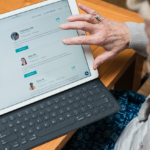Why the flu jab for carers is important, how it works, what the side effects are, and what you can do for yourself and your loved one if you get the flu.
Why there is a flu jab for carers
Getting vaccinated isn’t just about protecting yourself, it’s about protecting those around you. The more people who leave themselves open to contracting the flu virus, the more the virus can spread. This means that it’s not only important for those in the main risk groups to get vaccinated, but it’s also important for their carers.
The main risk categories include those who:
- Are over 65 years of age (or are 65 before March 31st 2018)
- Are pregnant
- Have certain medical conditions*
- Are living in long-stay residential care homes or other long-stay care facilities
- Receive carer’s allowance, or are the main carer for an elderly or disabled person whose welfare may be at risk if they fall ill
Caring for someone is a full time job and it’s easy to put your own needs on hold while prioritising the needs of the person you care for. As easy as it is to let that happen the costs will inevitably be felt by both of you, because if you contract the flu virus it’s more than likely that you will not be able to continue providing care.
While it’s not possible to maintain your health 100% of the time, the flu jab is a good way to help your body by giving it the armour it needs to fight infection.
Are you eligible?
If you are the primary carer for someone who is elderly or disabled, you should qualify to have the flu jab. Speak to your GP or pharmacist to arrange a flu jab at the same time as the person you care for.
Does it even work?
The flu virus is unpredictable and mutates every year. This means that the strain of virus that infects people and causes problems one year, adapts steadily before it begins to spread a year later. This is why a different vaccine needs to be produced every single year, to fight against the latest viral strain. For this reason the flu vaccine won’t protect against 100% of the flu strains that are active at any one time.
What it will do is alert your immune system to the type of attack it may face, so that it can prepare in advance. This means that even if you contract a slightly different strain to the one you’re vaccinated against, it’s likely that your symptoms will be reduced.
Are there side effects?
Serious side effects are very rare. At worst a mild fever and achy muscles can occur for a couple of days after injection, and some tenderness at the site of injection. Otherwise it is very unlikely that you will experience anything particularly unpleasant.
What to do if you get the flu
Look after yourself
When you have the flu it’s vital that you keep your fluid levels up. As it’s a virus, antibiotics will not work. Try to stay away from your GP surgery, and if you need advice arrange a telephone consultation. Rest is very important, so try to relax as much as possible, for example instead of going out to the shops, try ordering food to be delivered. If you’re feeling feverish and achy you can take paracetamol and ibuprofen, but be careful not to take too much. Treatments like Lemsip contain a full dose of paracetamol, so make sure you read the ingredients of any medicinal product before you take them.
Look after your loved one
If you are unlucky enough to contract the flu virus this year and you find yourself unable to care for your loved one, HomeTouch can help. You can find local carers in minutes using the postcode search below, and you can contact them directly to arrange care. If you need further help, our team is on hand to guide you through the process and a carer can be sourced within 24 hours.
Find out more:
Search for a Live In Carer
*Medical conditions include: asthma, chronic obstructive pulmonary disease (COPD), emphysema, bronchitis, chronic heart disease, chronic kidney disease, chronic liver disease, Parkinson’s disease, motor neurone disease, multiple sclerosis, diabetes, sickle cells disease, HIV, AIDS, if you’re currently taking steroid tablets or chemotherapy, or if you have a BMI of 40 or above.






